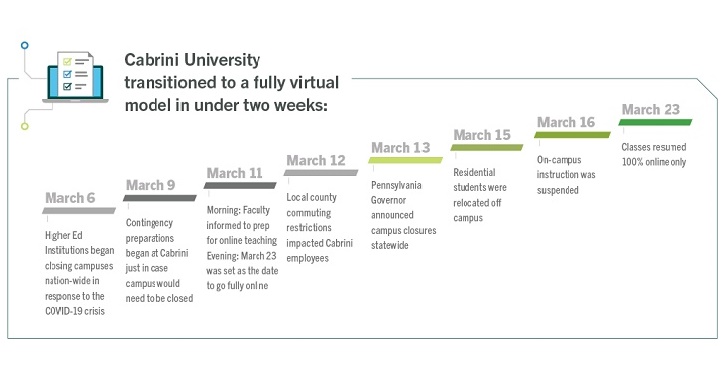The COVID-19 pandemic has been the driving force behind a whole slew of challenges society has faced so far in 2020. Its detrimental effects have hit every industry in some way, but higher education has been dealt some especially devastating blows.
When colleges and universities were called to abruptly close down campuses in the spring, they were forced to transition residential operations online virtually overnight. For many schools, this was a rude awakening that outdated technology ecosystems simply weren’t able to deliver the quality online experience and support that today’s students and faculty have come to expect.
But that wasn’t the case for Cabrini University. The private institution located outside of Philadelphia, Pennsylvania had already established a strong partnership with Collegis Education to digitally transform their online presence. So when the governor of Pennsylvania ordered all higher ed institutions to go fully remote on March 13, Cabrini was up for the challenge.
Building on an established foundation in technology
Cabrini was aware of the importance of investing in technology long before disaster struck. Prior to the pandemic, the college had partnered with Collegis to help strengthen its technology infrastructure and online learning platforms, putting them a step ahead of most schools at the time.
So when the Cabrini campus was closed, the following key elements were already in place:
- Online platform: An LMS platform with training materials was in place for all online programs.
- 24/7 virtual helpdesk: Technology support resources were available to help remote students and employees any time day or night.
- Connectivity: Most technology systems were remotely accessible through cloud-based apps and VPN solutions.
- Laptops: Most faculty and staff had laptops available to them, allowing for an easy transition to remote work.
Eric J. Olson, vice president of finance and treasurer at Cabrini University, believes the foundation that was put in place before COVID-19 helped the institution weather the storm that struck.
“The effort that went into building this infrastructure payed a lot of dividends for us when met with this crisis,” Olson says.
“The processes we’ve put in place have really made a lot of difference,” he adds.
Anticipating and addressing new challenges
Fortunately, when disaster hit, Cabrini already had access to the expanded technology support offered by Collegis’s large IT organization to implement or scale new technology quickly. But even so, the team faced new challenges that required immediate action:
- All programs required electronic course materials and exam proctoring.
- Some students lacked the technology needed to access online courses.
- Many faculty members were unfamiliar with online teaching.
- Digital communication and outreach became far more important and required greater access and training.
- In-person campus events had to be reimagined with virtual solutions.
- The entire Cabrini staff had to transition into a fully remote workforce.
- New information security vulnerabilities had to be anticipated and protected against.
Of these concerns, faculty adoption of online teaching was of utmost importance. Cabrini has a legacy of providing excellence in education and was determined to live up to that reputation even in a virtual environment.
With help from Collegis, training sessions were initiated around the clock along with the development of LMS user guides and materials for all faculty. Regular communication was established between Cabrini leadership and the Cabrini community via email, virtual townhall meetings and the campus portal.
New collaboration technology – such as Zoom and Microsoft Teams – deployed immediately to allow for convenient communication and synchronous learning options. 24/7 tech support was offered for students and staff, along with access to loaner laptops for those who needed one. Investments were also made in software programs that could help ensure exam integrity.
With the existing technology foundation and the support and guidance from Collegis to address new obstacles, Cabrini was able to transition to a fully virtual model in less than two weeks.

Empowering and supporting the virtual campus
Nearly every higher education institution across the country was faced with a similar timeline for quickly migrating residential classes to a virtual format. A handful of tactics were universally used to provide a temporary fix to finish out the term online, but Cabrini was determined to go a step further and provide the most enriching experience possible for their students.
Technology was the vital enabler in order to achieve this. With the help of Collegis, they were able to stream digital events via video platforms, provide virtual campus visits for new students and even host their highly anticipated annual Accepted Students Day in a remote format.
Collegis was also able to play an integral role in providing ongoing IT support for Cabrini through the crisis. This included providing the following:
- Virtual CIO services
- 24/7 student and staff IT support (including prospective students)
- Recommendations and guidance on use of technology platforms
- Training and support on expanded use of technology
- Assistance in processing CARES payments and refunds for students
- Information security vigilance of remote computers and connections
- Evaluation of enhanced classroom technology for the fall term
Moving forward with an uncertain future
With the uncertainty of the length and extent of the COVID-19 crisis, Cabrini and Collegis have continued to prepare for changes to teaching and learning for the remainder of the year and into 2021. This has involved planning for the increased usage of video learning options, scaling online learning platforms, embracing technology innovation and new features to platforms, and extending campus wi-fi coverage to include outdoor common areas.
Cabrini University’s rapid transition to fully remote operations is certainly a success story. The investments made over the past few years to strengthen their technology infrastructure undoubtedly helped prepare them to persevere through these unprecedented times. The importance of such efforts is more evident than ever in today’s higher education landscape.
But you don’t have to go at it alone. Implementing a full digital transformation is a lofty task. This is especially true for smaller institutions, like Cabrini, that simply don’t have the capacity to handle it all in-house.
“For schools like us that are small and resource-challenged, it doesn’t mean your technology needs are any less. So, you’re faced with issues of ‘how are we going to meet those needs?’” Olson shares. But in partnering with Collegis, Cabrini was able to overcome the challenges brought by COVID-19 and continue pushing forward in their mission of academic excellence, leadership development and a commitment to social justice.
Check out this on-demand webinar to hear firsthand about this successful partnership from Cabrini and Collegis leaders.
Author: Callie Malvik
Callie Malvik is a Senior Content Manager with Collegis Education. She holds a Bachelor's Degree in Mass Communication and Advertising from Winona State University, Minn.




